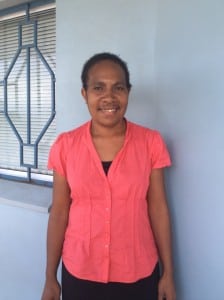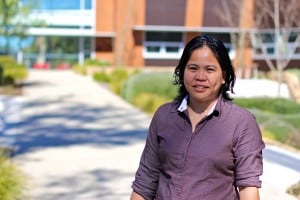
Our Case Management Centre in Lae opened its doors a year ago, on 25 July 2014. To celebrate our first anniversary, we posed a few questions to our CEO, Daisy Plana, and our Operations Manager, Denga Ilave.
Femili PNG has been operating for a year now. What would you say it has achieved?
Daisy: Well I think we have achieved a lot. Looking back to when we started, I could not then even imagine how much we would achieve.
Firstly, we’ve provided access for the clients who are high risk, and if they need safety and protection or a safe place to go, they can easily access that through our organisation. It’s not like before when we needed to really look for options for how we could help these clients.
Now it’s immediate. We have functional safe houses, we can just refer them there and they don’t worry about food, they don’t worry about clothing, they don’t worry about transportation. The immediate need for safety is provided to the client.
Second is the provision of comprehensive care. We are providing and are able to provide a complete package from the start of the intake, right through to working with the police and the courts, and then repatriation if required.
But we can only do this by working with others. We alone as an NGO cannot provide the full package of services. We always need to work with others. The police have a role, welfare has a role, health has a role, the courts have a role, the safe houses have a role, and we have a role too. We have seen that every stakeholder is very important for our cases to move forward.
What do you think is our biggest challenge going forward?
Denga: For me the most challenging thing can be getting the clients to realise their rights. That’s a very challenging part of this work. We try to help and support them to access the services, but some withdraw themselves from the support. So, for instance, they could withdraw their case from court after we having been working with them right through, and it’s the final stage. That’s the most challenging part. We need to educate our women that they have the right to live free and safe in their homes and communities.
The case management model relies on collaboration? How is that going?

Daisy: It is quite a challenge because we are an NGO and most of the work that we do with clients is asking for an effort from many government departments, like the police, hospitals, and court. We have different ways of working, but at the end of the day I think we understand that we are all there and working together to provide a better service to the client. We feel that we have achieved a certain collaboration where the goal is to support the client to access exactly what she wanted. We use case conferencing and discussions of our own challenges and issues to build collaboration and networking.
What motivates you? What keeps you going in this job?
Denga: Hearing positive feedback from the stakeholders and, of course, from some of the clients who benefit from our services is the thing that motivates me personally. And I am sure the other staff members feel the same. The clients really are satisfied with the service that we provide and that really motivates us.
What’s one client’s story that you could tell us that really illustrates the work of Femili PNG?
Denga: I have one particular client who was really physically assaulted for almost two days; that day and into the night. The client had a child who was around 9 years old, but the child could really see that the father would have definitely killed his mother, eventually. So, this poor child ran all the way from home and reported to the police station, and then the police went and got the woman out.
Unfortunately they did not arrest the perpetrator. The mother was brought into the Family Support Centre at Angau Hospital. There, she was referred to Femili PNG, and then I was called to do the initial intake and interview. She had bruises all over all over her body; she had sustained a lot of injuries and obviously this woman was very devastated and with two children, the 9 year old who reported it to the police station, crying, plus another younger child.
So, both of these children and the mother, we took them out, and put them at the safe house and accommodated them for quite some time; for some weeks. Then finally, we got the case registered at the police station to be filed in court.
The husband was supposed to be arrested and charged, however, he was on the run because he knew that the police were after him. So, we kept the client for quite a long time. After having a case discussion with the officer who was in charge of this particular case, he said that she could be repatriated. And, if the police were to arrest the perpetrator and if she needs to appear before the court, then the client can be brought back.
And so the woman decided to be repatriated back to her home province. I did the family tracing, and her family agreed. I coordinated with the welfare officer in her home province, and then this woman was repatriated with her two children. And now she feels much safer.
To support Femili PNG’s work, visit our donate page, or read more about the experiences of our clients and staff.


